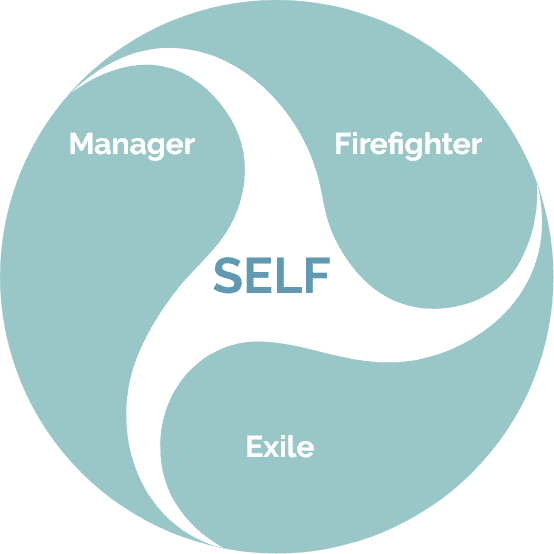Internal Family Systems (IFS)
therapy in Denver, Greenwood Village, & Lone Tree
Is IFS therapy for trauma?
If you’ve been asking yourself whether Internal Family Systems therapy is for you, we’re here to help. IFS is for individuals and couples whose feelings might seem like they’re in conflict and people who have feelings of shame and frustration with their actions. Research has shown that IFS is such a powerful form of therapy that it can also help with physical ailments as well.
IFS has been helpful for people who struggle with:
- Trauma and PTSD
- Losing interest in activities or hobbies
- Feelings of guilt, loneliness, and associated insomnia
- Panic attacks or an inability to regulate emotions, including anger
- Low self-esteem or motivation
- Lack of confidence or feeling powerless
- Struggling with a need for perfection
- Problems maintaining relationships and friendships
IFS has been shown to improve symptoms of anxiety, depression, body image, trauma, health conditions, obsessive tendencies, and more. It has also been shown to help improve one’s overall wellness by having a positive effect on all aspects of your life.
When you meet with an IFS therapist in Denver, you might find that it’s unlike other forms of therapy. In sessions, we welcome all parts of ourselves with compassion, curiosity, and understanding. It helps people be more accepting of the different parts of our personality. When we accept ourselves, we can heal and transform in unique, powerful ways. We stay focused on what could be causing issues and want you to understand yourself as a whole.
We build trust and care for each part of you, and then take the right steps to help your whole self function in a productive, positive, and healthy way. Our Denver IFS therapists in Lone Tree, Cherry Creek, and Greenwood Village create an environment and experiences that help you heal in a uniquely empowering way that respects all aspects of who you are.

Benefits of IFS therapy
- Move forward: Whether you’ve experienced trauma, addiction, or other issues, you can find healing from your past and discover a path forward when you understand how different parts of your work.
- Understand yourself: Learn how you can live a more fulfilling, centered, and focused life.
- Change patterns: Once parts of your understand each other, they can let go of destructive behaviors or thoughts and help you make progress in your life. Personal development: By better understanding all parts of you, you can move forward to achieve what you’ve been held back from.
- A different treatment option: Every person is different, and if another method, like DBT or CBT isn’t working as well for you, IFS is a different way for you to seek help.
- Self-empowering: Develop the ability to rely on yourself over time, freeing yourself from having to seek support in others.
- Reduce internal conflicts: By resolving conflicting beliefs and experiences, you can move towards a place of healing.
What is Internal Family Systems therapy (IFS)?
Internal Family Systems is a cutting edge, holistic therapy that heals attachment issues, trauma, shame, self-criticism and brings people back to a place where they can respect and like themselves again. It provides a step-by-step model that helps people heal and transform.
With IFS, people can establish balance within their internal system by better knowing themselves, understanding their own motivations and conflicts, and learning how to heal and move forward to become more successful in their relationships, work, and beyond. People learn how to support the various needs of their own internal system, which helps them relax and access their authentic, true selves from a place of compassion and strength.

Internal Family Systems
A central belief of IFS therapy is that humans are complicated, multi-layered, and made up of multiple parts that fulfill different roles, including these parts:
Exiles
Hold deep feelings of hurt, fear, and shame. They’ve often experienced trauma and become isolated to protect people from painful emotions. They can become desperate in hopes of being cared for or being able to tell their story.
Protectors
Protectors actively do things to protect you from harm for the sake of your everyday life.
Managers
Keep things working in everyday life and are focused on control and order. They try to keep control of situations and relationships to shield from negative feelings and rejection. They often keep exiles locked inside to hide their intense emotions from public view.
Firefighters:
Protect the exiles from their intense feelings by putting out fires when they appear; think excitement, intensity, and thrills. When protecting the exiles, this can often happen in negative ways, including substance abuse, self-harm, bingeing, and more. Over time, this can be more harmful than helpful because people lose connection to the source of their intense emotions. They have the same goals as managers, but use different methods.
Steps of IFS and “the 6 F’s”
The steps of IFS are used to work with different parts, including protectors, that are creating problems in someone’s life. Protectors actively do things to protect you from harm for the sake of your everyday life. Using these steps, we help you reconnect with the different parts of you and put you in position to nurture them. Learn more about the 6 steps.
The basic goals of the 6 F’s are to connect with your protectors, understand them, and create a relationship between the Self and the protector. In IFS, the 6 steps include:

The part in and around your body. Understand where it needs your attention.

Turn your attention inwards, towards the part. Putting yourself in position to learn about it and its qualities.it act the way that it does? What does it want for you?

Learn about the part. How does it look or feel? Are you close or far from it?

How do you feel about the part? Different parts often need to feel heard and noticed.

Find out more about the part and build a relationship with it. This establishes a good relationship between the Self and part.

What creates fear for this part that makes it act the way that it does? What does it want for you?
If you’re interested in learning more about the 6 F’s, here’s a video that explains the 6 F’s in more depth.

Self-energy and “the 8 C’s”
In IFS therapy, there’s a concept known as self-energy, a quality that lets us feel like we know ourselves, our tendencies, patterns, potential blind spots, weaknesses, and our strengths. We can empower ourselves to meet our own needs, and IFS therapy provides a guide to nurture yourself and grow.
IFS uses the 8 C’s “Calm, Connection, Compassion, Creativity, Clarity, Curiosity, Confidence and Courage” to expand upon the concept of self-energy. These all sound like positive words on their own, and IFS helps break away from the thoughts and behaviors that cover up the C’s.
Here are some more specifics about what each of the C’s means:

Calm – Being able to go through the ups and downs of life without being overwhelmed. Whatever happens, you’re along for the ride and feel at peace with it.

Connection – Feeling accepted and safe being who you are. Being connected means spending time with healthy relationships and doing things we feel connected to.

Compassion – Understanding and caring about others. Instead of feeling defensive, having empathy and wanting to help others where we can.

Creativity – Inspiration and connection to how we feel and think. This might be less rational, logical thinking, and more how we express ourselves through writing, art, music, and more. Creativity can lead to feeling completely engaged with an activity, which leads to a feeling of freedom and joy.

Clarity – Seeing situations for what they are, without being distracted by thoughts or emotions. Making the right decision becomes clear in many contexts, which can lead to improved confidence.

Curiosity – Being open and wanting to learn. Instead of making assumptions, we can ask questions to learn more about what might be unknown to us, helping us become less defensive in our interactions.

Confidence – Feeling balanced and steadfast about ourselves. Whatever happens, we’re capable handling it because we trust ourselves to think clearly and make decisions.

Courage – Embracing internal strength and feeling confident in our abilities. We can face what comes our way head on, instead of being a passive bystander. With courage, we can stand up for what we believe in and explore things that might once have seemed intimidating.
Getting started with IFS therapy
If you’re thinking about getting started with IFS therapy, here are some things to consider about this kind of therapy:
- Focuses on how the different parts of you interact, think, react, and express emotions.
- While people are complex, there are no “bad” parts of our internal systems. IFS puts emphasis on developing a relationship between the different parts of our selves.
- Creates understanding of how to work out internal conflicts and move towards a state where you can heal.
- Helps you find balance instead of experiencing feelings of stress or discomfort.
- Finds your voice to listen, guide, and support the different parts of yourself, instead of being held captive by reactive responses.
- Gives you hope that you can change the way that you experience life, react what to things that happen, and understand the way that you think.
Is IFS therapy legit?
Is IFS therapy legitimate? While some critics argue that the efficacy of IFS lacks scientific research, anecdotal evidence suggests its effectiveness in treating various mental health conditions and other issues. While further scientific studies are needed to substantiate these claims, many individuals have found IFS therapy to be a valuable approach in addressing their emotional well-being and a wide range of mental health conditions.
Meet our IFS therapists

ALLIE EVANS
Allie is passionate about helping people find joy in the present. Through IFS, she supports her clients through their healing journeys and treats every person’s journey as unique. Because of her expertise and training, Allie has become one of the most requested IFS therapists in the Denver area.
Allie is also trained in EMDR and is a Certified Sandplay Therapist.
She provides in-person therapy for children, teens, and adults in our Greenwood Village office.

GIGI WOODALL
Gigi works with her clients to foster self-discovery and personal growth on their own path of healing. She uses IFS to deepen her clients’ healing processes and gain new perspectives.
Gigi is also certified in Managing and Adapting Practices (MAP), is trained in Eye Movement Desensitization and Reprocessing (EMDR) and Ketamine-assisted therapy.
With her wide range of training, she provides in-person therapy for teens and adults in our Greenwood Village office.

COURTNEYROSE CHUNG
Courtneyrose is one of the most requested trauma therapists in Colorado.. She uses IFS when working with clients who have experienced acute and complex trauma.
Courtneyrose is also trained in Eye Movement Desensitization and Reprocessing (EMDR), Ketamine-assisted therapy, and Dialectical Behavioral Therapy (DBT), She sees clients virtually via teletherapy.
Other specialities

When we are no longer able to change a situation, we are challenged to change ourselves.
Victor Frankl
Meet our Denver therapists
My Denver Therapy is one of the largest woman-owned therapy private practices in Colorado with many of the best, most requested therapists in Denver.
As a therapist-owned practice with decades of combined experience, we care about seeing our clients heal, grow, and thrive. We’re one of the only therapy practices in Colorado with licensed professional counselors, marriage and family therapists, addiction counselors, social workers, and psychiatric nurse practitioners who actively see new clients. Whether you’re an adult, teen, young adult, couple, or family, our inclusive therapist team is built to specialize in you.
Our practice started with one therapist in a shared office suite, but we’ve grown to help thousands of people in Colorado by providing in-person therapy at our conveniently located Denver Metro area counseling offices in Denver, Greenwood Village, and Lone Tree, plus online therapy for clients throughout Colorado. Because of the way our team works, our therapists provide consultation for other therapists and private practices in the Denver Metro area.
Our inclusive therapists provide some of the most innovative, effective, and in-demand forms of therapy available today, including EMDR, Ketamine-assisted psychotherapy, CBT, and IFS. We also have more therapists trained in Ketamine-assisted therapy and more teen therapists and young adult counselors than nearly every other private practice in Denver.
We know that clients want to find the best therapists in Denver, so our team includes therapists with different backgrounds, specialities, and experiences to help you find the right fit. We’ll match you with one of our therapists who is the best for your goals, location, budget, and schedule to help you get started quickly.
We’re out of network for insurance, Tricare, and are unable to take Medicaid, but most of our therapists’ rates are lower than the local and national averages for therapy.
All of our therapists take a client-focused approach to counseling and approach each session with a commitment to your progress and growth.
Cherry Creek •
Wash Park •
Capitol Hill •
DU •
Lakewood •
Virginia Village •
Glendale •
Edgewater •
Highlands •
Downtown
DTC •
Centennial •
Englewood •
Southglenn •
Littleton •
Aurora •
Littleton •
Cherry Hills Village
Douglas County •
Parker •
Castle Rock •
Highlands Ranch •
Foxfield •
Castle Pines •
The Pinery •
Dove Valley •
Meridian
- With therapists and counselors in Denver, Greenwood Village, and Lone Tree, My Denver Therapy provides in-person counseling for adults, teens, couples, and families in Colorado.
- (720) 504-4329 (text us!)
- Find the right therapist for you
- Contact our Denver therapists
- Find a therapy office near you
SERVICES
ABOUT US
Please note: We’re unable to accept Medicaid or insurance.
Our rates are listed on our website. MDMA and Psilocybin-assisted therapy aren’t available yet. We are out of network for all types of insurance, including TRICARE.

















































